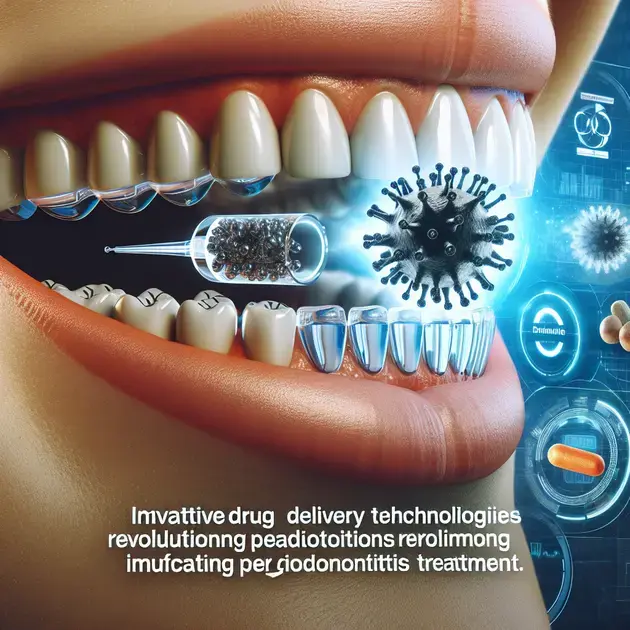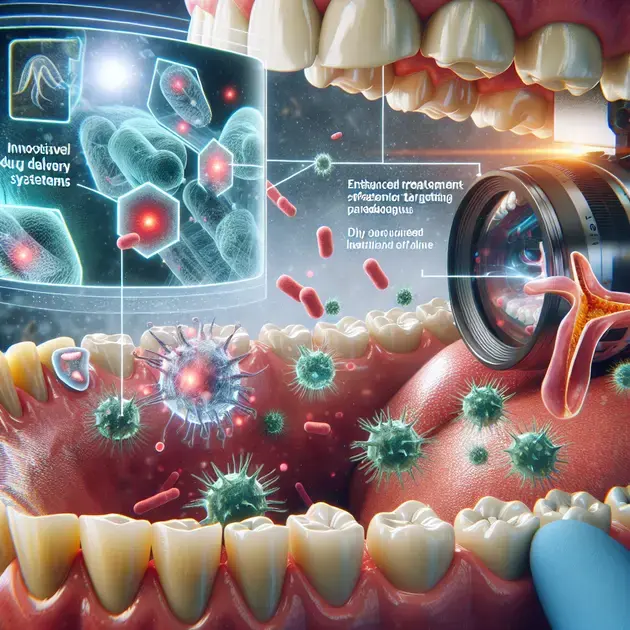Periodontitis is a serious gum infection that damages the soft tissue and destroys the bone that supports your teeth. Without proper treatment, periodontitis can lead to tooth loss and other complications. Therefore, understanding the importance of effective medication for periodontitis is crucial for maintaining good oral health.
With advancements in dental technology, there are now various medications available to treat periodontitis effectively. From antibiotics to antimicrobial mouthwashes, knowing the options and what to expect from each treatment can make a significant difference in combating this common dental issue.

Understanding the Impact of Periodontitis Medication
Periodontitis medication plays a crucial role in managing the progression of this inflammatory condition that affects the gums and bone supporting the teeth. Understanding the impact of these medications is essential for individuals undergoing treatment for periodontitis. Medications such as antibiotics, antimicrobials, and pain relievers are commonly prescribed to address the infection and discomfort associated with periodontitis.
One key aspect of periodontitis medication is its ability to target and eliminate the bacteria causing the infection. Antibiotics like doxycycline can be used to reduce inflammation and control bacterial growth in the gums. Antimicrobial mouth rinses containing chlorhexidine may also be recommended to help combat bacteria and prevent plaque buildup.
It is important for patients to follow their dentist or periodontist’s instructions carefully when taking medication for periodontitis. Failure to complete the full course of antibiotics, for example, can lead to antibiotic resistance and treatment failure. Understanding the impact of periodontitis medication involves adhering to prescribed dosages and schedules to maximize the effectiveness of the treatment.
Regular dental check-ups are essential while undergoing periodontitis medication, as monitoring the progress of the condition is crucial for adjusting treatment as needed. By understanding the impact of these medications and following prescribed guidelines, patients can effectively manage periodontitis and improve their oral health.
Exploring Various Treatment Options for Periodontitis
When dealing with periodontitis, exploring various treatment options can help individuals find the most suitable approach for their condition. From non-surgical procedures like scaling and root planing to surgical interventions such as flap surgery and bone grafts, there are several options available to address periodontitis.
One common non-surgical treatment for periodontitis is scaling and root planing, where plaque and tartar are removed from the teeth and root surfaces to promote gum healing. This procedure is often performed by a dental hygienist and may require multiple appointments to complete.
In cases where non-surgical treatments are not sufficient, surgical interventions may be recommended. Flap surgery involves lifting the gums to remove tartar deposits and smooth irregular surfaces on the roots, while bone grafts aim to regenerate lost bone tissue in the affected areas.
Other treatment options for periodontitis include laser therapy, which uses focused light energy to remove infected tissue and promote healing, as well as systemic antibiotics prescribed to combat bacterial infections. By exploring these various treatment options with the guidance of a dental professional, individuals can find a personalized approach to managing their periodontitis effectively.
Tips for Choosing the Right Medication for Periodontitis
When selecting medication for periodontitis, there are several factors to consider to ensure the most effective treatment outcome. Consulting with a dentist or periodontist is crucial in determining the right medication based on the individual’s specific condition and medical history.
One tip for choosing the right medication is to discuss any allergies or sensitivities to certain drugs to avoid adverse reactions. It is also important to inform the healthcare provider about any other medications being taken to prevent potential drug interactions.
Another consideration when choosing medication for periodontitis is the dosage and duration of the treatment. Following the prescribed dosage and completing the full course of medication is essential in combating the infection and preventing recurrence of periodontitis.
Patient compliance with medication instructions, including timing and frequency of doses, is vital for the success of the treatment. Keeping a detailed record of the medication schedule and any side effects experienced can help both the patient and the healthcare provider monitor progress and make adjustments if necessary.
By following these tips and working closely with a dental professional, individuals can select the right medication for periodontitis and achieve optimal oral health outcomes.

**Exploring the Role of Genetic Factors in Periodontitis Treatment Strategies**
Periodontitis is a complex inflammatory disease that affects the supporting structures of the teeth, leading to tissue destruction and eventually tooth loss if left untreated. While factors such as poor oral hygiene and smoking are well-known contributors to the development of periodontitis, recent research has highlighted the role of genetic factors in influencing an individual’s susceptibility to the disease.
Genetic studies have identified specific gene variants that may increase the risk of developing periodontitis. These variants can affect the immune response to periodontal pathogens, the production of inflammatory molecules, and the integrity of the periodontal tissues. Understanding these genetic factors can help tailor treatment strategies to target the underlying causes of the disease and improve outcomes for patients.
By incorporating genetic testing into the diagnostic process, healthcare providers can identify individuals who may be at higher risk for severe periodontitis and personalize their treatment plans accordingly. This personalized approach may involve more frequent dental cleanings, targeted antibiotic therapy, or the use of adjunctive treatments to modulate the immune response.
Furthermore, ongoing research is exploring the potential for gene therapy to treat periodontitis by targeting specific genetic abnormalities that contribute to the disease. While this approach is still in its early stages, it holds promise for the development of innovative and highly effective treatments for periodontitis in the future.
In conclusion, uncovering the role of genetic factors in periodontitis treatment strategies opens up new possibilities for personalized and targeted interventions. By integrating genetic information into the management of periodontal disease, healthcare providers can optimize treatment outcomes and improve the long-term oral health of their patients.
**Incorporating Lifestyle Changes for Enhanced Periodontitis Medication Efficacy**
Along with traditional periodontitis medications, lifestyle changes can play a significant role in enhancing the effectiveness of treatment and promoting overall oral health. Factors such as diet, stress levels, and tobacco use can impact the progression of periodontitis and the response to medication, making lifestyle modifications an important aspect of comprehensive care.
One key lifestyle change that can enhance periodontitis medication efficacy is adopting a healthy diet rich in nutrients that support gum health. Foods high in vitamins C and D, antioxidants, and omega-3 fatty acids can help reduce inflammation, boost the immune system, and support tissue repair in the gums.
Additionally, managing stress levels through relaxation techniques, exercise, and adequate sleep can lower the body’s inflammatory response and promote healing in the gums. Stress has been linked to an increased risk of periodontitis and can hinder the effectiveness of medication, making stress management an essential component of treatment.
Quitting smoking is another crucial lifestyle change that can significantly improve the efficacy of periodontitis medication. Smoking not only weakens the immune system and reduces blood flow to the gums but also interferes with the body’s ability to heal and fight off infections, making it harder to control periodontal disease.
By integrating lifestyle changes such as a healthy diet, stress management, and smoking cessation into the treatment plan, patients can enhance the effectiveness of periodontitis medication and improve their overall oral health. Healthcare providers should educate patients on the importance of these lifestyle modifications and provide support and resources to help them make lasting changes for better treatment outcomes.
**The Future of Periodontitis Medication: Innovations and Expectations**
As research into periodontitis continues to advance, the future of medication for the disease holds great promise for innovative treatments and improved outcomes for patients. One area of development is the exploration of novel drug delivery systems that can target periodontal pathogens more effectively and reduce the need for frequent administration of medications.
Nanotechnology is playing a crucial role in the development of advanced drug delivery systems for periodontitis. Nanoparticles loaded with antimicrobial agents or anti-inflammatory drugs can penetrate deep into periodontal tissues, providing sustained release and enhanced efficacy compared to traditional forms of medication.
Another area of innovation is the use of probiotics and prebiotics to promote a healthy oral microbiome and protect against periodontal disease. By replenishing beneficial bacteria in the mouth and creating an environment that inhibits the growth of harmful pathogens, probiotics and prebiotics can serve as a natural and safe adjunct to traditional medication for periodontitis.
Gene therapy is also on the horizon as a potential treatment for periodontitis, with the ability to target specific genetic factors that contribute to the disease. By modulating gene expression in periodontal tissues, gene therapy holds promise for addressing the root causes of periodontitis and achieving long-lasting results for patients.
In conclusion, the future of periodontitis medication is bright with innovative treatment options on the horizon. From advanced drug delivery systems to the use of probiotics, prebiotics, and gene therapy, patients can look forward to personalized and effective treatments that target the underlying mechanisms of the disease for improved oral health outcomes.
Conclusion
Exploring the role of genetic factors in periodontitis treatment strategies uncovers new possibilities for personalized interventions and targeted care. Genetic studies have revealed specific gene variants that can increase the risk of developing periodontitis, impacting immune response and tissue integrity. By incorporating genetic testing, healthcare providers can identify high-risk individuals and tailor treatment plans, potentially including more frequent dental cleanings, targeted antibiotics, or adjunctive therapies.
Lifestyle changes, such as adopting a nutrient-rich diet, managing stress, and quitting smoking, play a vital role in enhancing the efficacy of periodontitis medication. A healthy diet can support gum health, while stress management and smoking cessation can improve treatment outcomes. Integrating these lifestyle modifications into the treatment plan can significantly enhance medication efficacy and overall oral health.
The future of periodontitis medication holds promise with innovative treatments on the horizon. Advanced drug delivery systems using nanotechnology show potential for more effective targeting of periodontal pathogens, while probiotics and prebiotics promote a healthy oral microbiome. Gene therapy offers a futuristic approach to targeting genetic factors contributing to the disease, potentially providing long-lasting results for patients.



